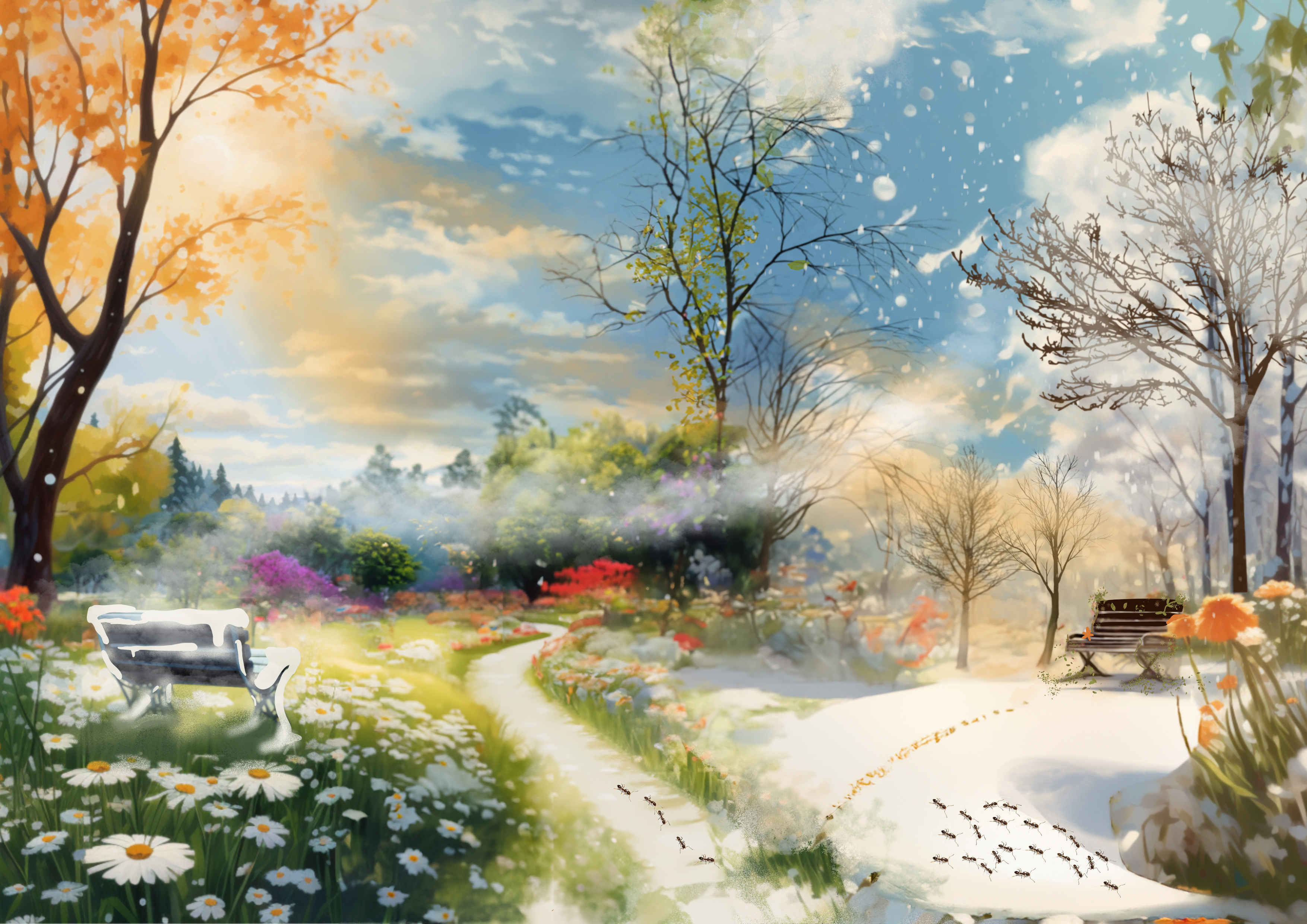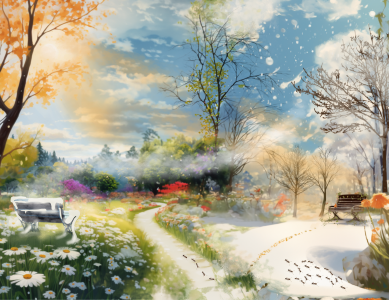“Think winter during summer and think summer during winter.” Jim Rohn
Many have lived through a blissful summer, minds unclouded by thoughts of winter, only to be caught off guard by its first drizzle of rain. And some have endured a seemingly endless winter, hopeless that summer will never come again.
Yet, it’s not the fickle nature of fortune that can almost flatten us with despair; it’s the mental state in which we receive it in utter shock, as if betrayed. Often unprepared, expectations left unchecked and unmanaged, clinging to illusions of permanence and certainty. Our greatest hope—and sometimes to our great disappointment—is that tomorrow will be the same as today.
If we persist as we are, so will everything else, as if we’ve made a sacred pact with the unforeseeable, believing we will be spared what has not missed others: “It was their labors, their mishandling, or their poor character perhaps that tore their worlds apart.” But as the perfect citizens, we should be just fine.
In houses of wood, stone, or castles of concrete, shielded by a veil from the elements, there’s a tranquil serenity. No hint of an impending storm. Nature’s natives, however, come programmed with resilience, constantly adapting, their senses finely tuned to the whispers of the wind. Not us…the sharp attunement to shifting seasons has been dulled by the convenience of the times. Marcus Aurelius once said, ‘Everything heard is an opinion, not fact. Everything seen is a perspective, not the truth.’ To navigate the tides of fortune, one has to shed the illusion for the foresight of nature’s most resilient worker: the ant.
“Think winter during summer” and “think summer during winter.” The great late Jim Rohn once noted the importance of adopting the Ant Philosophy in one of his seminars.
What does that mean exactly?
Rohn remarked that ants never quit. “If they’re going somewhere and you try to stop them or block their pathway, they’ll look for another way, up, down, or all around. How long will they keep looking? Till they find another way.”
Another thing about ants is that they think winter all summer. During the summer, ants collect food, bringing it back, knowing that during winter, it will be difficult to do so; they’re always in a hurry “thinking winter, winter, winter during summer.” In the summer, they’re thinking this winter won’t last for long, we will be soon out of here…thinking of summer all winter.
In other words, “think of the negative during the positive and of the positive during the negative.” Let negativity (winter) be the catalyst for positivity, and positivity (summer) be the antidote to negativity. Often, the most profound realizations and decisions arise from challenging experiences. Rohn stated, “Negativity should not be ignored; it should be mastered.” This is the essence of the Ant Philosophy in practice.
Adam’s Story: Thinking summer all summer long
Adam always dreamed of a big life for as long as he can remember. He’d go up to the roof as a boy, gaze into the night sky, and say: “Please, God, fly me away from this small town; give me a big life.” He imagined everyone in cosmopolitan cities looking as if they jumped straight out of a TV commercial with perfect hair and pearly whites, living in impeccable houses, wearing colorful clothes, driving shiny cars, and exuding effortless sophistication. Two decades later, from his office on the 20th floor, Adam would often get lost in the horizon where the sea met the sky, feeling like he owned the world.
He adorned his body with symbols of his newfound wealth: a prominent ‘H’ on his belt, a tie patterned with subtle ‘H’s, and shoes stamped with ‘LV’ on either side. He would have worn his jacket inside out to flaunt the large ‘V’ sewn into the collar. Conversations often ended with a deliberate twist of his wrist and a prolonged look at his Rolex. “I must dash; the market doesn’t wait for anyone,” cutting people off in midsentence before walking away and driving off in his sleek, brand-new Lamborghini Huracán.
Old money is silent, new money is typically very loud.
It’s not that he didn’t earn his spot; he worked very hard for it, relentlessly, in fact. But it wasn’t enough; he desperately wanted everyone to acknowledge and cheer his arrival at his first mountain top. Yet Adam is not unique in that way. Perhaps if we lived in a bubble where no one could see another’s accomplishments, there wouldn’t be any motivation to do anything at all.
Every day felt like an endless summer, with the world’s conveniences just a call or click away. To Adam, loss, accidents or tragedies were things that only happened to other people. He wined and dined and gloated and boasted until in its untimely timeliness – a downturn here, a pandemic there, a war here, technological progress there – the wind came and blew it all away.
He wasn’t prepared for those moments when his world would evaporate into dust. Adam teetered on the edge of losing either his life or his mind, if not for the prayers of his parents and a couple of good friends in his life who remembered the man before he made it big and for their own kindness. They stuck around despite the unpleasantness now perpetually infused in his atmosphere.
It’s a mystery to him till this day how he kept himself glued together. As unfathomable as it may be in moments of glory, sanity is such a fragile thing and only those profoundly blessed that can maintain their wits when stripped of everything, but the shirt on their backs.
Once filled with meetings, calls, and emails, Adam’s days were instead imbued with complete silence. He had missed the taste of hazelnut mocha and decided to pamper himself by having it at the coffee shop down the street, his attention wandering until it settled on an old man, about 80, carrying a heavy sack on his back, as if containing all his worldly possessions. Adam approached the old man, and without a word, reached into his right-side pocket and gave him whatever was there. In his usual habit, he didn’t count the money when giving in charity; because he was conscious of the fact that the Almighty always gave him without counting. The old man’s eyes widened in shock. “God bless you,” he said, “It’s been a long time since I’ve held 30 dollars in my hand.” Adam had to turn back home after that, realizing he had just given away most of his wealth.
That encounter made him decide to stop grieving his misfortune because although he had lost much, many never had anything to begin with. With his newfound freedom, he can reinvent himself into whatever he wanted to be, a sense of purpose renewed. He began to frequent local libraries, absorbing knowledge not just about business, but about life, philosophy, and the world at large.
As the months turned into years, Adam found himself at the helm of various community initiatives. He became an advocate for the homeless and underprivileged, using his past experiences and connections to bring about change. His story became an inspiration to many, a tale of reinvention and self-discovery.
In his later years, Adam would often say, “I had to lose everything to find myself again.” And while the world remembers him for his community work, Adam knew that his most outstanding achievement was not the accolades or the success but the inner peace he had found in himself.
Becoming Sarah: From Survival to Arrival
The most important question to ask on the job is not ‘What am I getting?’ The most important question to ask on the job is ‘What am I becoming?'” — Jim Rohn
Sarah had been an administrative assistant for the same chief for a decade at least. Every morning, she’d clock in, prepare for the day, and jot down her tasks. One day – the day Everything changed for her – she looked down at her list and noticed that it looked 99% similar to yesterday’s, the day before, and the day before that. She hadn’t been learning or growing; she’d been in a perpetual loop, trapped in a never-ending winter of stagnation.
That evening, as she entered the house, she burst into tears. The frustration of feeling stuck, of not living up to her potential, was overwhelming. At 50, she knew it was no use crying over spilled milk, but the realization weighed heavily in her heart. She found herself at a crossroads. She began by identifying the sources of her discontent and then charted out a plan to address each one. Those were her first few steps. Although she felt too old to learn or do something else with her life, but what was the alternative? She couldn’t possibly face another day of painstaking monotony. She needed to discover what she would be genuinely interested in. something with a future that would change her life.
Among the ideas scribbled down was her long-standing fascination with AI. She remembered reading articles about its potential to revolutionize industries, from healthcare to finance and the world as we know it. Sarah had always been intrigued by the idea of machines thinking and learning, but she had dismissed it as a field for the younger generation, for those with technical backgrounds.
She started by enrolling in an online course, an A-to-Z guide on AI for beginners. The initial modules were challenging, filled with jargon and concepts that went over her head. But Sarah was undeterred. She joined online forums, sought help from younger enthusiasts, and spent hours watching tutorials.
Months turned into a year, and Sarah found herself not just understanding AI but developing a passion for it. She began attending local tech meetups, networking with professionals in the field, and even started a small project using AI to optimize administrative tasks – a nod to her past job.
In one of the forums, Sarah connected with a young enthusiast named Alex. They began collaborating on a project that involved using Python to develop a machine learning model for predictive analytics. Sarah’s unique perspective, blending her administrative experience with her newfound AI knowledge, impressed Alex. Their collaboration led to the creation of a prototype that garnered attention in the forum.
After several months of online interactions, Alex introduced Sarah to his boss at a local tech startup that specialized in AI-driven solutions for businesses. The introduction led to a series of discussions, and Sarah’s contributions to their joint project became a significant talking point. Before she knew it, Sarah was offered a position in the company. She might have been one of the older members of the team, but her age was never seen as a barrier; instead, it was an asset. She brought a wealth of experience and a fresh perspective that the younger team members often lacked.
Sarah’s journey was a testament to the fact that age is just a number and that it’s never too late to dive deep into the world of tech. She not only broke out of her routine but also ventured into a field that she once thought was out of her reach. In doing so, she became an inspiration to many, proving that with determination to learn, one can change one’s life at any age.
I know that not everyone has the privilege to take this road. Many of us have families, responsibilities, and liabilities. But your journey doesn’t have to end here. You have the right to give yourself this opportunity, no matter how dark your winter may be.
“When you hold onto your history, you do so at the expense of your destiny.”
Co-Authored by Tala Bacouni and Muriel Al-Mufti
Art for Muriel’s Blog by Mariam Beirouty


